RabbitMQ 的第一个程序
点击上方蓝色字体,选择“置顶或者星标”
优质文章第一时间送达!
RabbitMQ 的第一个程序
RabbitMQ-生产者|消费者
搭建环境
java client
生产者和消费者都属于客户端, rabbitMQ的java客户端如下
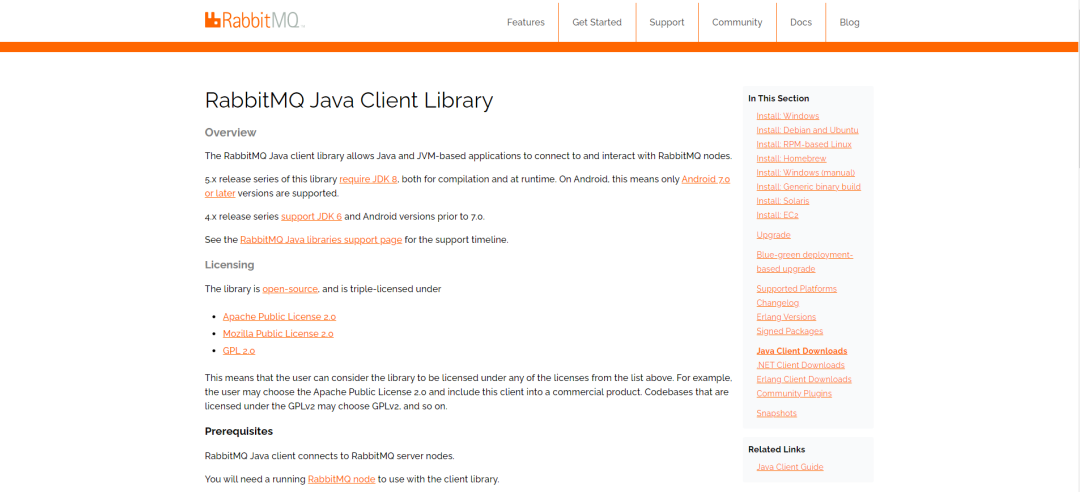
创建 maven 工程
<dependency>
<groupId>com.rabbitmqgroupId>
<artifactId>amqp-clientartifactId>
<version>5.10.0version>
dependency>
AMQP协议的回顾

RabbitMQ支持的消息模型
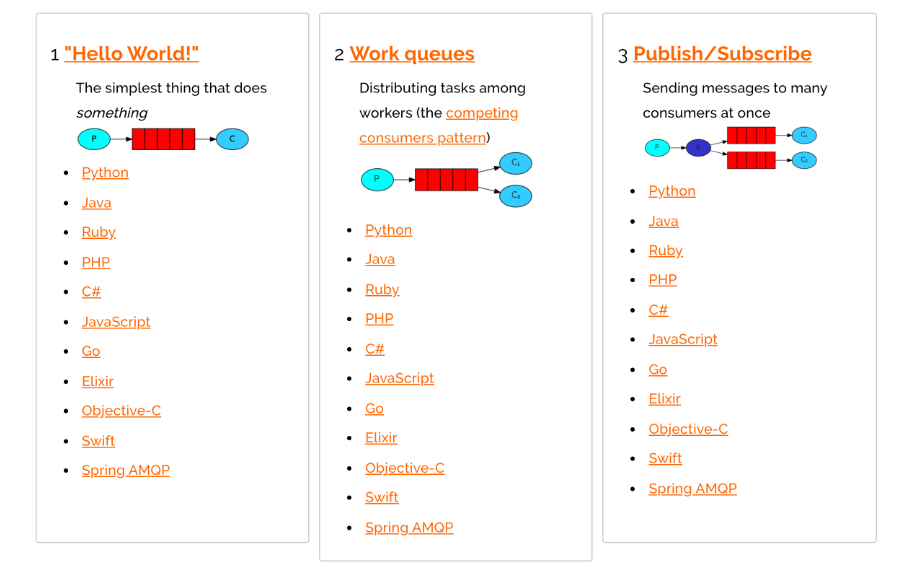
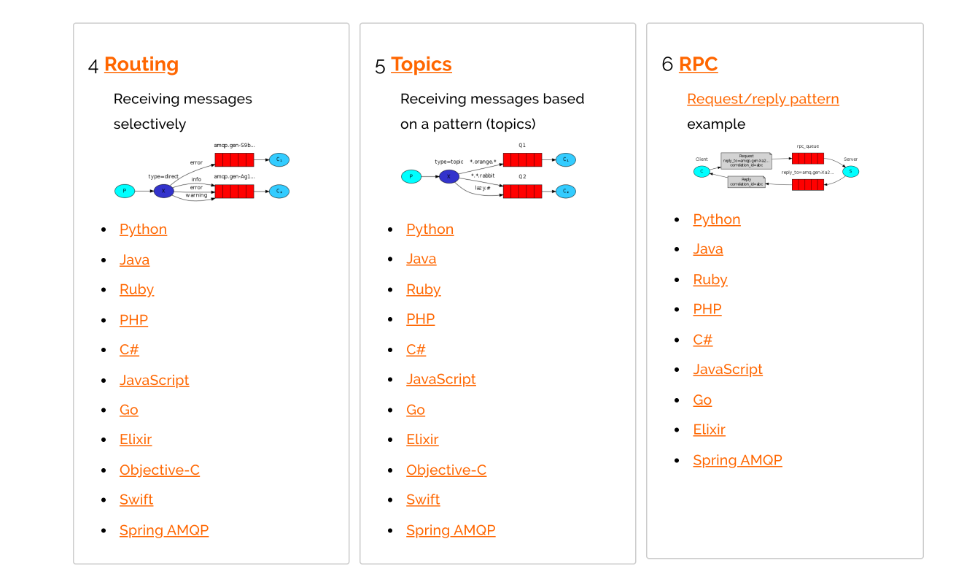
第一种模型(直连)
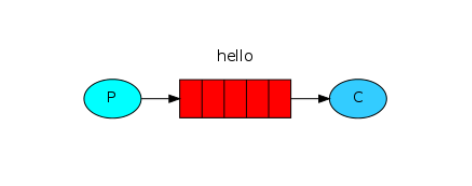
在上图的模型中,有以下概念:
- P:生产者,也就是要发送消息的程序
- C:消费者:消息的接受者,会一直等待消息到来。
- queue:消息队列,图中红色部分。类似一个邮箱,可以缓存消息;生产者向其中投递消息,消费者从其中取出消息。
开发生产者
/**
* 生产者
*
* 直连模式
*
* @author mxz
*/
@Component
public class Provider {
public static void main(String[] args) throws IOException, TimeoutException {
// 获取连接对象
Connection connection = RabbitMQUtils.getConnection();
// 获取连接中通道
Channel channel = connection.createChannel();
// 通道绑定消息队列
// 参数1 队列的名称, 如果不存在则自动创建
// 参数2 用来定义队列是否需要持久化, true 持久化队列(mq关闭时, 会存到磁盘中) false 不持久化(关闭即失)
// 参数3 exclusive 是否独占队列 true 独占队列 false 不独占
// 参数4 autoDelete 是否在消费后自动删除队列 true 自动删除 false 不删除
// 参数5 额外的附加参数
channel.queueDeclare("hello", false, false, false, null);
// 发布消息
// 参数1 交换机名称
// 参数2 队列名称
// 参数3 传递消息额外设置
// 参数4 消息的具体内容
channel.basicPublish("", "hello", null, "hello rabbitMQ".getBytes());
RabbitMQUtils.closeConnectionAndChannel(channel, connection);
}
}
开发消费者
/**
* 消费者
*
* @author mxz
*/
@Component
public class Customer {
public static void main(String[] args) throws IOException, TimeoutException {
// 获取连接对象
Connection connection = RabbitMQUtils.getConnection();
// 创建通道
Channel channel = connection.createChannel();
// 通道绑定对象
channel.queueDeclare("hello", false, false, false, null);
// 消费消息
// 参数1 消息队列的消息, 队列名称
// 参数2 开启消息的确认机制
// 参数3 消息时的回调接口
channel.basicConsume("hello", true, new DefaultConsumer(channel) {
// 最后一个参数 消息队列中取出的消息
@Override
public void handleDelivery(String consumerTag, Envelope envelope, AMQP.BasicProperties properties, byte[] body) throws IOException {
System.out.println("new String(body)" + new String(body));
}
});
// channel.close();
// connection.close();
}
}
工具类
/**
* @author mxz
*/
public class RabbitMQUtils {
private static ConnectionFactory connectionFactory;
// 重量级资源 类加载执行一次(即可)
static {
// 创建连接 mq 的连接工厂
connectionFactory = new ConnectionFactory();
// 设置 rabbitmq 主机
connectionFactory.setHost("127.0.0.1");
// 设置端口号
connectionFactory.setPort(5672);
// 设置连接哪个虚拟主机
connectionFactory.setVirtualHost("/codingce");
// 设置访问虚拟主机用户名密码
connectionFactory.setUsername("codingce");
connectionFactory.setPassword("123456");
}
/**
* 定义提供连接对象的方法
*
* @return
*/
public static Connection getConnection() {
try {
return connectionFactory.newConnection();
} catch (Exception e) {
e.printStackTrace();
}
return null;
}
/**
* 关闭通道和关闭连接工具方法
*
* @param connection
* @param channel
*/
public static void closeConnectionAndChannel(Channel channel, Connection connection) {
try {
// 先关 channel
if (channel != null)
channel.close();
if (connection != null)
connection.close();
} catch (Exception e) {
e.printStackTrace();
}
}
}
第二种模型(work quene)
Work queues,也被称为(Task queues),任务模型。当消息处理比较耗时的时候,可能生产消息的速度会远远大于消息的消费速度。长此以往,消息就会堆积越来越多,无法及时处理。此时就可以使用work 模型:让多个消费者绑定到一个队列,共同消费队列中的消息。队列中的消息一旦消费,就会消失,因此任务是不会被重复执行的。
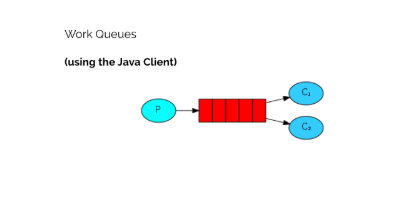
角色:
- P:生产者:任务的发布者
- C1:消费者-1,领取任务并且完成任务,假设完成速度较慢
- C2:消费者-2:领取任务并完成任务,假设完成速度快
开发生产者
/**
* 生产者
*
* 任务模型 work quenue
*
* @author mxz
*/
@Component
public class Provider {
public static void main(String[] args) throws IOException, TimeoutException {
Connection connection = RabbitMQUtils.getConnection();
Channel channel = connection.createChannel();
// 通过通道声明队列
channel.queueDeclare("work", true, false, false, null);
for (int i = 0; i < 10; i++) {
// 生产消息
channel.basicPublish("", "work", null, (" " + i + "work quenue").getBytes());
}
// 关闭资源
RabbitMQUtils.closeConnectionAndChannel(channel, connection);
}
}
开发消费者-1
/**
* 自动确认消费 autoAck true 12搭配测试
*
* 消费者 1
*
* @author mxz
*/
@Component
public class CustomerOne {
public static void main(String[] args) throws IOException, TimeoutException {
// 获取连接对象
Connection connection = RabbitMQUtils.getConnection();
// 创建通道
Channel channel = connection.createChannel();
// 通道绑定对象
channel.queueDeclare("work", true, false, false, null);
// 消费消息
// 参数1 消息队列的消息, 队列名称
// 参数2 开启消息的确认机制
// 参数3 消息时的回调接口
channel.basicConsume("work", true, new DefaultConsumer(channel) {
// 最后一个参数 消息队列中取出的消息
// 默认分配是平均的
@Override
public void handleDelivery(String consumerTag, Envelope envelope, AMQP.BasicProperties properties, byte[] body) throws IOException {
System.out.println("消费者-1" + new String(body));
try {
Thread.sleep(1000);
} catch (InterruptedException e) {
e.printStackTrace();
}
}
});
// channel.close();
// connection.close();
}
}
开发消费者-2
/**
* 自动确认消费 autoAck true 12搭配测试
*
* 消费者 2
*
* @author mxz
*/
@Component
public class CustomerTwo {
public static void main(String[] args) throws IOException {
// 获取连接对象
Connection connection = RabbitMQUtils.getConnection();
// 创建通道
Channel channel = connection.createChannel();
// 通道绑定对象
channel.queueDeclare("work", true, false, false, null);
channel.basicConsume("work", true, new DefaultConsumer(channel) {
// 最后一个参数 消息队列中取出的消息
@Override
public void handleDelivery(String consumerTag, Envelope envelope, AMQP.BasicProperties properties, byte[] body) throws IOException {
System.out.println("消费者-1" + new String(body));
}
});
// channel.close();
// connection.close();
}
}
测试结果
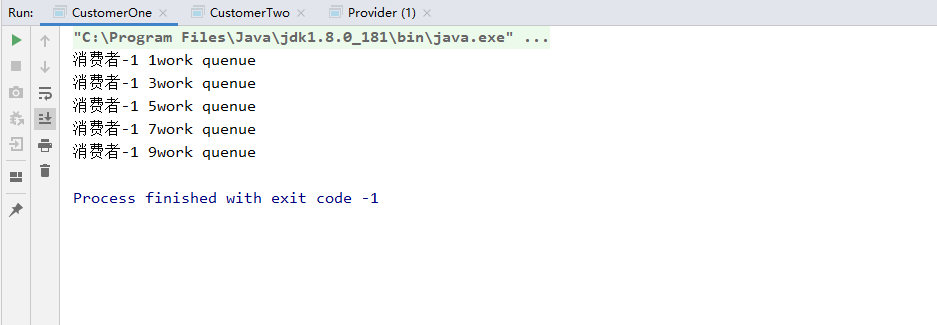
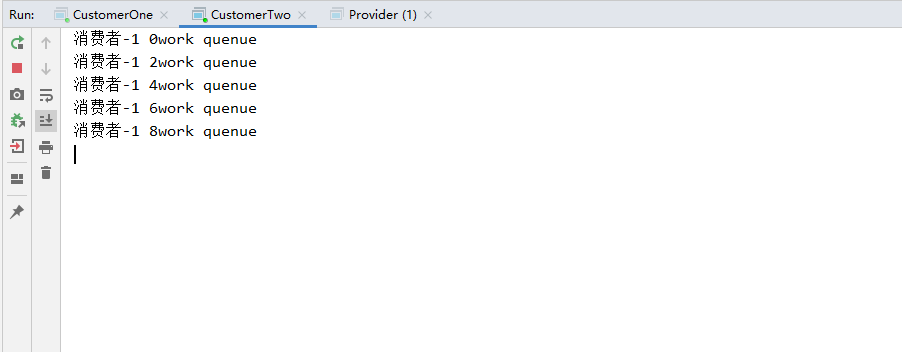
总结:默认情况下,RabbitMQ将按顺序将每个消息发送给下一个使用者。平均而言,每个消费者都会收到相同数量的消息。这种分发消息的方式称为循环。
消息自动确认机制
Doing a task can take a few seconds. You may wonder what happens if one of the consumers starts a long task and dies with it only partly done. With our current code, once RabbitMQ delivers a message to the consumer it immediately marks it for deletion. In this case, if you kill a worker we will lose the message it was just processing. We'll also lose all the messages that were dispatched to this particular worker but were not yet handled.
But we don't want to lose any tasks. If a worker dies, we'd like the task to be delivered to another worker.
消费者3
/**
* 能者多劳 34 搭配测试
*
* 消费者 3
*
* @author mxz
*/
@Component
public class CustomerThree {
public static void main(String[] args) throws IOException, TimeoutException {
// 获取连接对象
Connection connection = RabbitMQUtils.getConnection();
// 创建通道
Channel channel = connection.createChannel();
// 每一次只能消费一个消息
channel.basicQos(1);
// 通道绑定对象
channel.queueDeclare("work", true, false, false, null);
// 参数1 队列名称 参数2(autoAck) 消息自动确认 true 消费者自动向 rabbitMQ 确认消息消费 false 不会自动确认消息
// 若出现消费者宕机情况 消费者三可以进行消费
channel.basicConsume("work", false, new DefaultConsumer(channel) {
// 最后一个参数 消息队列中取出的消息
// 默认分配是平均的
@Override
public void handleDelivery(String consumerTag, Envelope envelope, AMQP.BasicProperties properties, byte[] body) throws IOException {
System.out.println("消费者-1" + new String(body));
// 手动确认 参数1 确认队列中
channel.basicAck(envelope.getDeliveryTag(), false);
try {
Thread.sleep(1000);
} catch (InterruptedException e) {
e.printStackTrace();
}
}
});
// channel.close();
// connection.close();
}
}
消费者4
/**
* 能者多劳 34 搭配测试
*
* 消费者 4
*
* @author mxz
*/
@Component
public class CustomerFour {
public static void main(String[] args) throws IOException {
// 获取连接对象
Connection connection = RabbitMQUtils.getConnection();
// 创建通道
Channel channel = connection.createChannel();
// 每一次只能消费一个消息
channel.basicQos(1);
// 通道绑定对象
channel.queueDeclare("work", true, false, false, null);
channel.basicConsume("work", false, new DefaultConsumer(channel) {
// 最后一个参数 消息队列中取出的消息
@Override
public void handleDelivery(String consumerTag, Envelope envelope, AMQP.BasicProperties properties, byte[] body) throws IOException {
System.out.println("消费者-1" + new String(body));
// 手动确认 参数1 手动确认
channel.basicAck(envelope.getDeliveryTag(), false);
}
});
// channel.close();
// connection.close();
}
}
文章已上传gitee https://gitee.com/codingce/hexo-blog
项目地址: https://github.com/xzMhehe/codingce-java
更多推荐内容
↓↓↓
如果你喜欢本文
请长按二维码,关注公众号
转发朋友圈,是对我最大的支持哟
以上,便是今天的分享,希望大家喜欢,觉得内容不错的,欢迎「分享」「赞」或者点击「在看」支持,谢谢各位。
